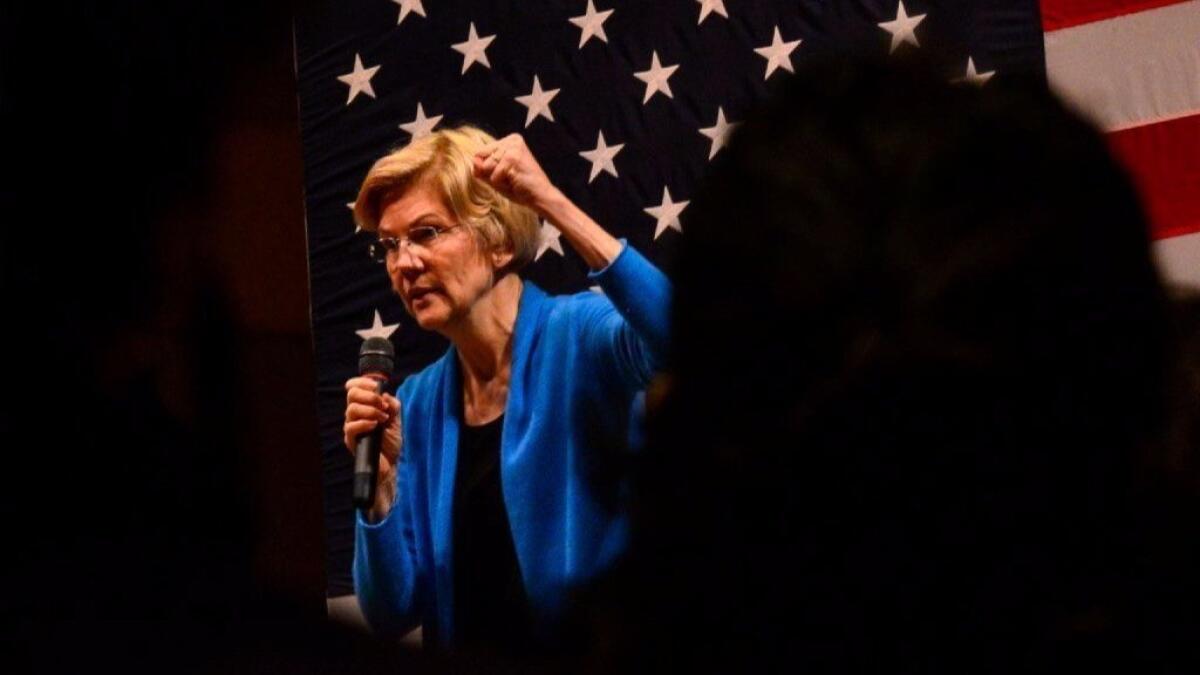Elizabeth Warren proposes canceling student loan debt and offering free public college

Reporting from Washington â Sen. Elizabeth Warren of Massachusetts is unveiling a proposal to wipe out student debt for millions of borrowers, making her the only major 2020 presidential candidate to advance such an ambitious plan to relieve the growing burden of higher-education loans on Americans and the economy.
The proposal would cancel up to $50,000 in debt for people with annual household income under $100,000. Beyond that income threshold, smaller amounts of debt would be canceled, but no one with more than $250,000 in household income would be eligible.
To keep students from accumulating more debt in the future, Warren also proposes making two- and four-year public colleges tuition free, according to a plan unveiled in advance of a Monday evening CNN town hall focused on issues of interest to young voters.
With a price tag of $1.25 trillion over 10 years, Warrenâs higher-education initiatives up the ante on an issue that most 2020 Democratic presidential candidates have been trying to address in more modest ways.
At issue is the top economic challenge for a key Democratic constituency â millennial voters, many of whom have gone to college and left school during a decade that has seen an explosion of student borrowing. Student loan debt has more than doubled, to about $1.5 trillion, over the last decade, according to a Federal Reserve report that found the trend has contributed to declining rates of homeownership among young adults.
âThe time for half measures is over,â said Warren said in a post on Medium describing her proposals. âMy broad cancellation plan is a real solution to our student debt crisis. It helps millions of families and removes a weight thatâs holding back our economy.â
RELATED: A shift to the left pulls Democratic candidates in different directions for 2020 »
The high-dollar proposal will surely face pushback from Republicans but also from some Democratic rivals. Sen. Amy Klobuchar (D-Minn.) has said she opposes tuition-free four-year public college, although she favors free community college. Pete Buttigieg, mayor of South Bend, Ind., has objected to broad student-debt cancellation, preferring more-targeted debt relief.
Warren said the cost of the program would be covered by some of the $2.75 trillion in revenue that would be raised from the âwealth taxâ she has proposed â a 2% tax on Americans with assets worth more than $50 million, with an additional 1% surcharge on wealth over $1 billion.
With the 2020 presidential field continuing to grow and nearing 20 Democrats, candidates have each been looking for ways to distinguish themselves. Warren, despite her higher national profile, has not been in the top tier in most polls and in recent fundraising reports.
Late last week, she distinguished herself by becoming the first major candidate to call for impeachment proceedings against President Trump after the release of special counsel Robert S. Mueller IIIâs report on Russian interference in the 2016 election. Her position appeals to her partyâs left wing but is at odds with congressional leaders and other Democrats who are wary of launching a process in the Democratic House that is unlikely to succeed in the GOP-controlled Senate.
A campaign aide said Warrenâs impeachment pronouncement did not signal a shift in her focus on âbig policyâ initiatives that have been the hallmark of her campaign. She has offered detailed proposals on subjects such as child care, anti-corruption and breaking up big technology companies â all designed to address what she sees as inequities in the U.S. economic and political systems.
Sen. Bernie Sanders (I-Vt.) was one of the earliest and most vocal proponents of tuition-free public college, beginning in his unsuccessful 2016 presidential campaign. Most of the other 2020 Democratic presidential candidates have offered proposals to ease student debt and make college tuition free, but most of those plans impose conditions such as income limits or public-service commitments in order to qualify.
RELATED: Behind grass-roots talk, big checks remain lifeblood for 2020 presidential hopefuls »
Warren is proposing free tuition and fees at two- and four-year public colleges for students of all income levels, with costs shared by state and federal governments. She argues the policy should be universal, not targeted just on lower-income people, in the same spirit in which free public education is now available to all through high school.
She is also proposing additional federal spending on Pell Grants to help low-income students meet other non-tuition costs; additional aid for black colleges; and more money for states that increase enrollment and graduation rates for people of color.
The debt forgiveness benefits would be based on income, but an analysis of the plan conducted for the Warren campaign by a group of academic economists estimates that the policy would provide some relief for more than 95% of all households with student debt and would wipe out all debt for up to 76.2% of indebted households.
Warren also takes aim at for-profit colleges, which have been criticized for saddling low-income students and people of color with debt while providing degrees of dubious career value. She calls for cutting off for-profit colleges from receiving any federal aid âafter an appropriate transition period.â
More to Read
Get the L.A. Times Politics newsletter
Deeply reported insights into legislation, politics and policy from Sacramento, Washington and beyond. In your inbox three times per week.
You may occasionally receive promotional content from the Los Angeles Times.











